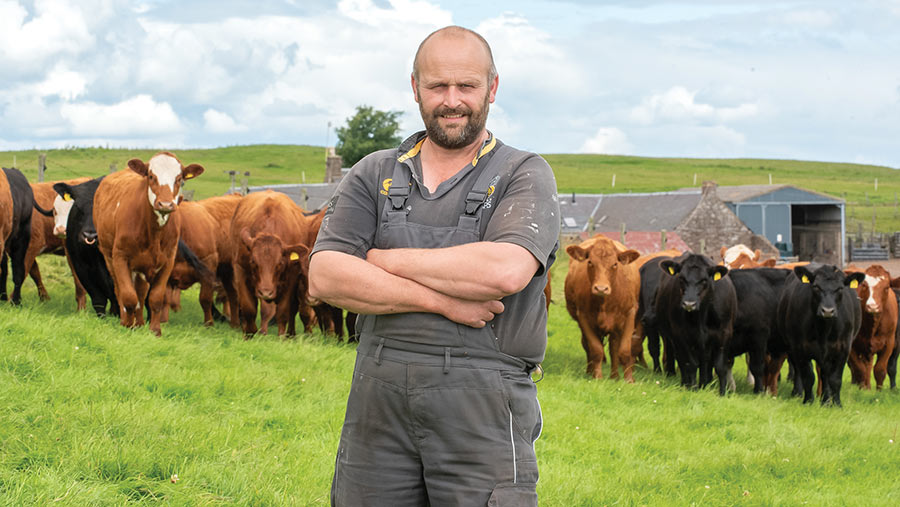Farmers Weekly Awards 2023: Grassland Manager of the Year
 John Ritchie © Angus Findlay
John Ritchie © Angus Findlay John Ritchie of Montalt Farm, Perthshire, is the 2023 Farmers Weekly Grassland Manager of the Year.
Improved grassland management has helped lift stocking rates at Montalt Farm by 40%, as well as deliver large reductions in feed and fertiliser.
This has resulted in the business bucking the trend for upland beef and sheep farms by achieving 22% gross profits as a percentage of turnover, without accounting for subsidy.
John has created a rotational grazing system that is now growing 2t more grass – at 8.2t/ha dry matter (DM), on average – compared to when animals were set stocked.
See also: Farmers Weekly Awards 2023: Grassland Manager of the Year finalists
Farm facts
- 146ha owned and 126ha rented
- 550 Logie Hybrid ewes and 95 Saler suckler cows put to Simmental, Angus and Saler bulls
- Land rises to 300m above sea level and mainly comprises shallow or wet soils
- Lambs sold to M&S through Scotbeef
- Store cattle and breeding heifers sold direct to two farmers.
Management strategy
Sheep are given priority access to fresh grass, followed by cattle. John runs two-day shifts on the grazing platform, which has been subdivided into 90 paddocks, averaging 1.3ha.
This practice has extended the grazing season by eight weeks in recent years.
In the summer, sheep enter grass covers of 2,800kg DM/ha and will graze down to 2,100kg, with cattle expected to clean out paddocks to 1,700kg. John says this leader-
follower system has been a “revelation”, improving grass utilisation and maintaining animal growth rates.
Lambs achieved daily growth rates of 295g/day up to weaning this year and were sold off grass by September.
More impressively, he has saved 20t of concentrate by no longer supplementing ewes. Instead, pasture is rested for 100-120 days over the winter and grazed on pre-lambing rotation.
Scanning rates averaged 210% in 2022, although John concedes this is too high for outdoor lambing and wants to cut back.
The herd of 95 Saler-cross cows is body condition scored with cows below 3 outwintered on deferred hill ground, and those scoring above 3 are put on forage rape and oat straw to reduce winter housing costs.
Only youngstock are housed and fed quality silage over winter. Growing cattle average 1.1kg during spring and summer grazing, despite the fact they never get the first bite of grass, and will average 0.8kg while indoors.
Breeding selection pressure has resulted in exceptional levels of cow fertility. Cows calve for eight weeks in March with just 2.5% empty last year.
On average, 75% of heifers were in calf after a three-week bulling period in 2022, with suckler herdlife averaging 7.9 years.
John is getting good persistence from leys too, with reseeds lasting 10 years on average.
The poorest yielding pastures are burnt off and direct-drilled with forage rape, then reseeded in spring with red clover and ryegrasses using min-till.
Ground is soil sampled annually with 120t/year of lime applied to achieve a target pH 6.5.
Only 37kg N/ha is applied to silage fields and 62kg N/ha to forage crops, and no fertiliser is used on the grazing platform.
The future
John believes contentment breeds complacency. He intends to start experimenting with new breeds, and wants to lift cattle numbers but cut back on ewes to reduce workload and improve grass utilisation further.
Together with wife Alix, John shares his knowledge by hosting pupils from local high schools who are studying rural skills.
He is also a mentor to four fellow grassland farmers through the British Grassland Society.
A word from our independent judge
“John has developed a grazing system that is delivering personal and financial goals.
“By matching pastures to stock classes and focusing on key success factors, he is successfully navigating that fine line between maximising utilisation and maintaining animal performance with minimal inputs.”
Emily Grant, independent beef and sheep consultant
Winning ways
- Delivering healthy profits without subsidy
- Huge reductions in fertiliser and feed while lifting stocking rates by growing more grass
- Has established a close relationship with repeat buyers and is adding value
- Robust flock and herd health, and exceptional fertility
- Intrinsically wildlife friendly despite not being in any environmental agreements
The Farmers Weekly 2023 Grassland Manager of the Year Award is sponsored by Germinal
 The Farmers Weekly Awards celebrates the very best of British agriculture by recognising hard-working and innovative farmers across the UK.
The Farmers Weekly Awards celebrates the very best of British agriculture by recognising hard-working and innovative farmers across the UK.
Find out more about the Awards, the categories and sponsorship opportunities on our Awards website.
